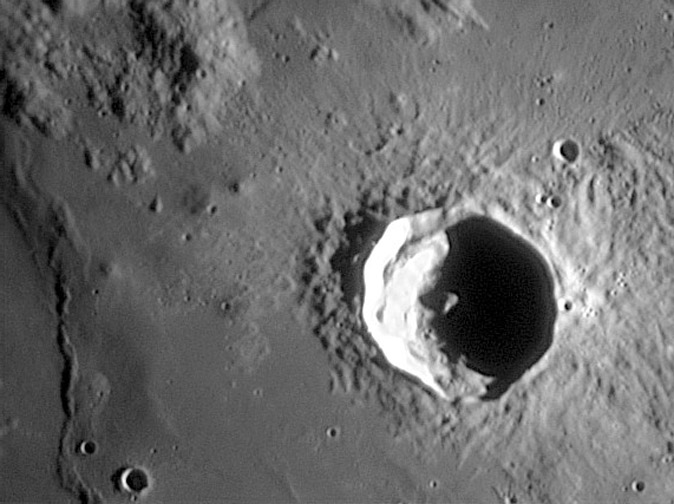
Image by Bruno Daversin
Manilius is the largest crater between Mare Vaporum and Mare Serenitatis. It sits on ejecta from the formation of the Imbrium basin and small marial marshes. But as this high resolution image from Bruno reveals, ejecta from Manilius drapes the mare to its north, but not the mare to the west. At least some lavas from Vaporum must be younger than Manilius. This image also depicts three small domes and two to four other possible domes to the north and west of the crater. The largest dome (about 7 km in diameter and here informally called #1) rests against a small braided mare ridge, and appears to have a small summit pit and an impact crater on its flank. Immediately east of this dome is an elongated swell area that is not quite a dome. To the north is a tiny (3.4 km diameter) dome (#2) with a relatively large central pit. East of this dome are two circular hilly areas. The first (#3) has a bumpy surface and an impact crater on its edge cloest to Manilius. Just to the east of this structure is a low dome (#4) with a steep, off-central peak jutting above it. I don’t know if these latter two objects should be classified as domes, but they are suggestive. North-northwest of Manilius is another dome (#5) with a central pit. This is a flat-topped little volcano 4.0 km across. Between #2 and #3 is a rimless pit that is not on top of an obvious hill but there is a suggestion of a low to imaginary dome perhaps 13 km wide. The amazing thing about these delicate structures is that all of them, except #5, are shown on the Geophysical Lunar Researches Group’s dome map! Bruno’s excellent image will allow these domes to be located and studied with greater precision than before. Bravo!
Technical Details:
05 Apr. 2006. Ludiver Observatory 600 mm (24″) Schmidt-Cassegrain + webcam + IR filter.
Related Links:
Rükl plates 23 & 34
Ludiver’s Moon photos
Yesterday's LPOD: Not Quite a Bulls-Eye
Tomorrow's LPOD: Color on the Cheap
COMMENTS?
Register, Log in, and join in the comments.



